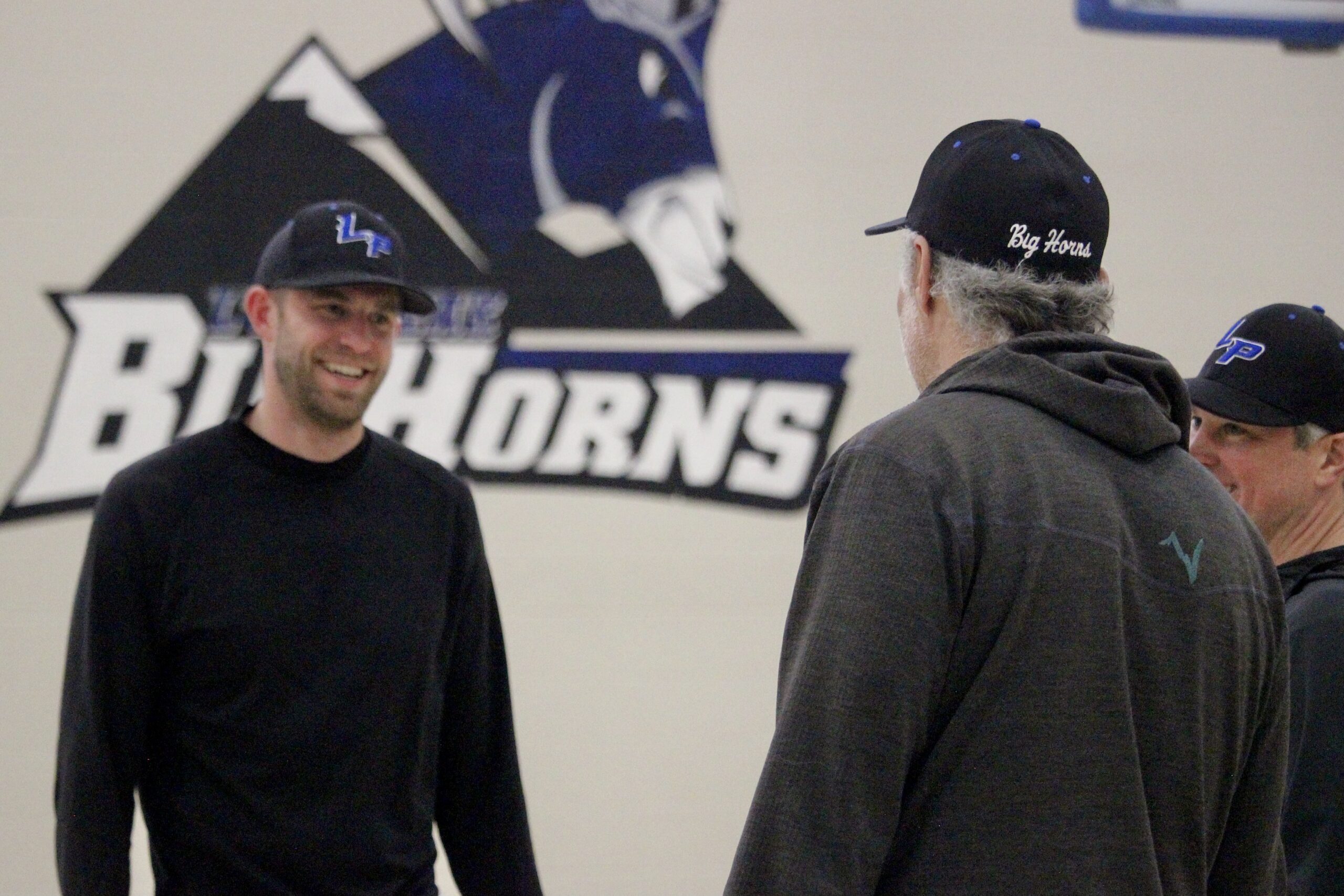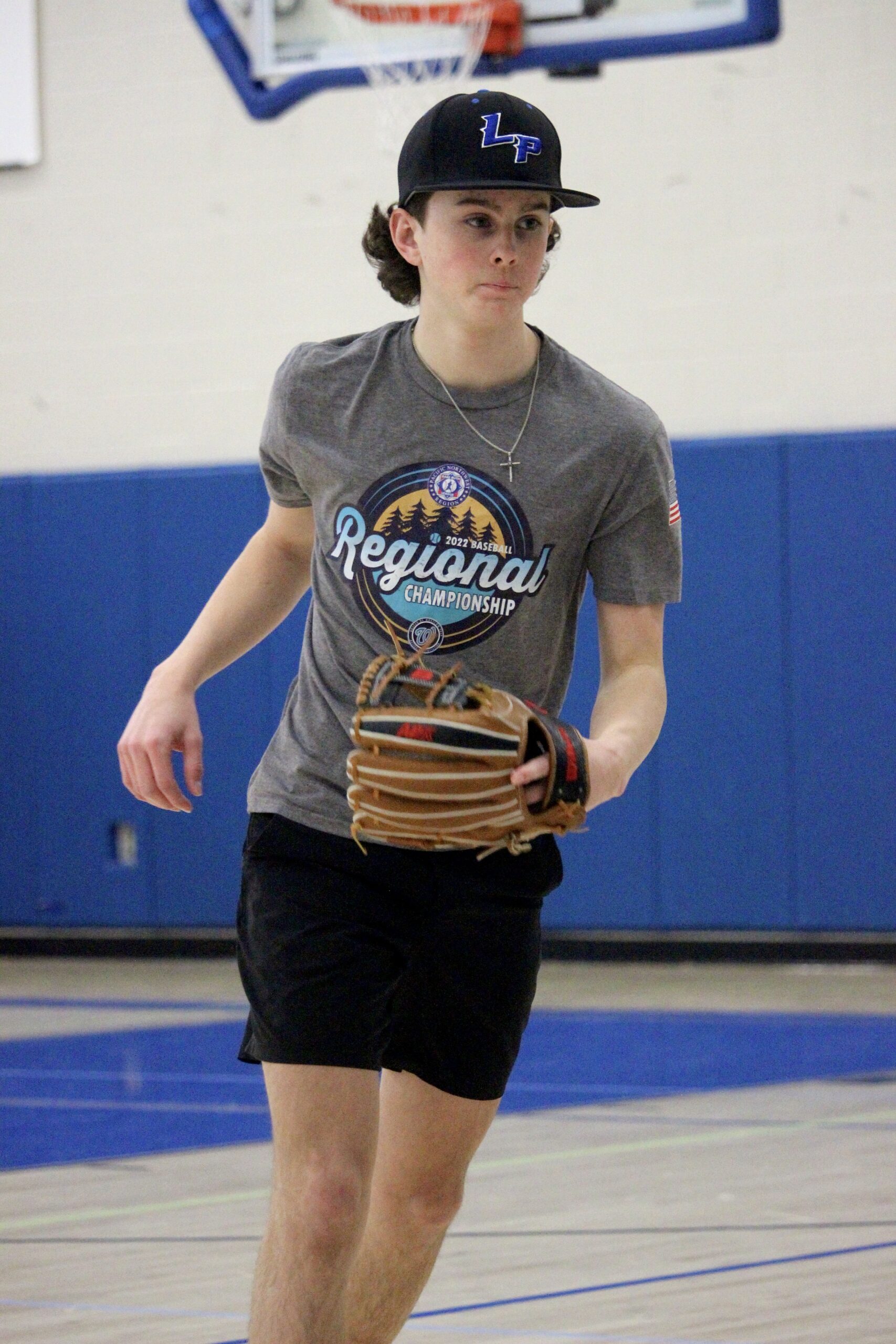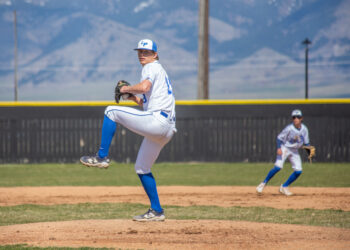When snow melts, Lone Peak High School will join debut high school baseball league
By Jack Reaney STAFF WRITER
Montana has become the 48th state to adopt high school baseball and the Lone Peak High School Big Horns are on deck.
When the Montana High School Association voted to sanction the sport in January 2022 after a feasibility study, two dozen high schools opted to launch a baseball program. Even with Lone Peak’s Class-C-sized enrollment of 122 students, Athletic Director John Hannahs was convinced by prospective coaches John McGuire and Matt Morris, who saw strong interest. They filled a roster of 21 boys—roughly one-third of the eligible student body. It was enough to add a junior varsity squad.
“I think it comes down to having a group of people who can help you establish that program,” Hannahs told EBS. “John and Matt have an incredible amount of experience, and they’ve got the passion to go after it and make my life easier… [They] were really the champions of getting things started.”

To adhere to Title IX, the school needed to add a girls sport as well. Hannahs said they chose to add girls cross country in fall 2022, but the program lacked interest and nobody competed. The program will take sign-ups again next fall.
Morris founded the Big Sky Royals youth baseball program, which assembles a handful of teams across three levels to compete against teams in Belgrade’s Little League. McGuire said the baseball community owes a debt of gratitude to Morris, who grew the program “from nothing” to roughly 60 ballplayers this year, counting high school. McGuire coached the first Royals Babe Ruth team.
The Big Horns will also be coached by Brad Johnson and Ryan Rothing.
“We’re thrilled at the turnout,” Morris told EBS. “We’re surprised by a lot of upperclassmen that have decided to play baseball and haven’t played in years. It’s giving kids another opportunity to play a varsity sport, and we’re pumped about that.”
The current freshman class has been playing together since T-ball. Morris and McGuire, who both have sons on the team, got the Royals program going with that same age group.
“It’s just really come together with Montana high school baseball where these ninth graders are now looking for a place to play, and here we are,” Morris said.
McGuire added, “We’ve got a young core as well, so we feel the program is set up for growth in the next couple years.”

The state league combines schools of all sizes, and Lone Peak will compete in the East Division against high schools from Sidney/Fairview, Belgrade, Butte, Butte Central and Columbus. With the Big Horns’ opener delayed by snow, coaches expect the inaugural season to last just one month before the state tournament in mid-May.
Morris hopes that after this year the MHSA might extend the season by a few weeks. It currently ends in May to allow for a transition to American Legion Baseball, but if high school ball gains steam, Legion might not need to start so early in Montana.
Ron Edwards is an enduring community leader through his work with the Big Sky County Water and Sewer District. He also serves as the general chairman of Montana and Alberta baseball for the American Legion and said MHSA baseball complicates things.
“If your program has a high school team, you can’t be working out with the Legion team until they’re done… We’ve also said Legion teams aren’t going to play high school teams,” Edwards told EBS.
He said Legion programs typically play as many as 65 games, and he doesn’t think MHSA will extend the season much more than a week, since summer break starts in early June. If they do extend, it will cut into the Legion season. He added that with 64 Legion teams in Montana, there’s been no lack of baseball opportunity—although high school baseball comes without an entry fee, unlike Legion baseball.
Edwards said high school baseball might spark communities to create an American Legion team. He also said it might take away from Legion, as players get their “baseball fix” through school. Most of all, Edwards isn’t convinced MHSA baseball will produce high-level ball.
“This is a great example of why Montana has never had high school baseball, because Bozeman’s fields [are] under two feet of snow,” Edwards said. “It’s early season, pitchers aren’t ready to throw that much, crappy weather… It’s Montana.”
Nonetheless, Edwards expressed excitement about the Big Horns and the team’s uniquely experienced coaching staff. He said he plans to attend the state tournament in Butte.
‘It’s Montana baseball’
Hannahs said spring sports in Montana are always a challenge. As of late March, there’s still too much snow to start clearing the turf for practice space, and the school facilities team is working to clear the running track first. On March 28, sprinters jumped hurdles in the main hallway, shared with golfers chipping plastic balls toward a small target.
“We show up here, see what we’ve got, and then we make our practice plan,” Morris said. “These guys are 15 to 18 years old, and the gym is just too small for us. But we’re making do. We’re getting our pitchers ready, our catchers, and we’re able to hit in a cage. And those are the main things. But as far as situational baseball, we’re lacking a little bit.”
Morris pointed out that it’s Montana baseball, and snow is a problem for many teams across the state.
“It’s gonna be awesome for these kids,” McGuire said. “We just gotta get outside and that’s a matter of time.”

The original schedule had the Big Horns season opener scheduled for April 1, against Butte High School. They planned to play at Medina Field in Belgrade, but the field isn’t ready. Coaches believe their season opener will be delayed past April 6 and 7, scheduled in Columbus and Belgrade. They’re eyeing a possible first pitch on April 15 in Columbus, against Dillon High School.
The Big Horns’ next home game would be April 27 against Columbus, and they will try to play at Big Sky’s Community Park—one of the 60-foot softball diamonds was retrofitted for 90-foot adult baseball. Medina Field will be the team’s backup plan when they need to rent a dry field.
Long term, the Big Horns might pursue their own baseball field.
“If that’s a possibility, I’m sure we would pursue it if we see the program has legs,” Hannahs said. “It will be interesting to see what happens with the rest of the state, because this is new for everybody.”













